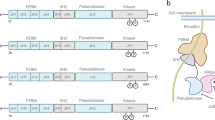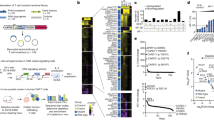Abstract
The closely related non-receptor tyrosine kinases FEline Sarcoma (FES) and FEs Related (FER) are activated by cell surface receptors in hematopoietic cells. Despite the early description of oncogenic viral forms of fes, v-fes, and v-fps, the implication of FES and FER in human pathology is not known. We have recently shown that FES but not FER is necessary for oncogenic KIT receptor signaling. Here, we report that both FES and FER kinases are activated in primary acute myeloid leukemia (AML) blasts and in AML cell lines. FES and FER activation is dependent on FLT3 in cell lines harboring constitutively active FLT3 mutants. Moreover, both FES and FER proteins are critical for FLT3-internal tandem duplication (ITD) signaling and for cell proliferation in relevant AML cell lines. FER is required for cell cycle transitions, whereas FES seems necessary for cell survival. We concluded that FES and FER kinases mediate essential non-redundant functions downstream of FLT3-ITD.
This is a preview of subscription content, access via your institution
Access options
Subscribe to this journal
Receive 12 print issues and online access
$259.00 per year
only $21.58 per issue
Buy this article
- Purchase on Springer Link
- Instant access to full article PDF
Prices may be subject to local taxes which are calculated during checkout






Similar content being viewed by others
References
Small D . FLT3 mutations: biology and treatment. Hematology Am Soc Hematol Educ Program 2006; 1: 178–184.
Gilliland DG, Griffin JD . Role of FLT3 in leukemia. Curr Opin Hematol 2002; 9: 274–281.
Drexler HG, Quentmeier H . FLT3: receptor and ligand. Growth Factors 2004; 22: 71–73.
Naoe T, Kiyoi H . Normal and oncogenic FLT3. Cell Mol Life Sci 2004; 61: 2932–2938.
Stirewalt DL, Radich JP . The role of FLT3 in haematopoietic malignancies. Nat Rev Cancer 2003; 3: 650–665.
Zheng R, Levis M, Piloto O, Brown P, Baldwin BR, Gorin NC et al. FLT3 ligand causes autocrine signaling in acute myeloid leukemia cells. Blood 2004; 103: 267–274.
Tickenbrock L, Muller-Tidow C, Berdel WE, Serve H . Emerging Flt3 kinase inhibitors in the treatment of leukaemia. Expert Opin Emerg Drugs 2006; 11: 153–165.
Choudhary C, Muller-Tidow C, Berdel WE, Serve H . Signal transduction of oncogenic Flt3. Int J Hematol 2005; 82: 93–99.
Smithgall TE, Rogers JA, Peters KL, Li J, Briggs SD, Lionberger JM et al. The c-Fes family of protein-tyrosine kinases. Crit Rev Oncog 1998; 9: 43–62.
Greer P . Closing in on the biological functions of Fps/Fes and Fer. Nat Rev Mol Cell Biol 2002; 3: 278–289.
Bardelli A, Parsons DW, Silliman N, Ptak J, Szabo S, Saha S et al. Mutational analysis of the tyrosine kinome in colorectal cancers. Science 2003; 300: 949.
Greenman C, Stephens P, Smith R, Dalgliesh GL, Hunter C, Bignell G et al. Patterns of somatic mutation in human cancer genomes. Nature 2007; 446: 153–158.
Voisset E, Lopez S, Dubreuil P, De Sepulveda P . The tyrosine kinase FES is an essential effector of KITD816V proliferation signal. Blood 2007; 110: 2593–2599.
Stirewalt DL, Meshinchi S, Radich JP . Molecular targets in acute myelogenous leukemia. Blood Rev 2003; 17: 15–23.
Lasota J, Miettinen M . Clinical significance of oncogenic KIT and PDGFRA mutations in gastrointestinal stromal tumours. Histopathology 2008; 53: 245–266.
Valent P . Systemic mastocytosis. Cancer Treat Res 2008; 142: 399–419.
Quentmeier H, Reinhardt J, Zaborski M, Drexler HG . FLT3 mutations in acute myeloid leukemia cell lines. Leukemia 2003; 17: 120–124.
Yu H, Maurer F, Medcalf RL . Plasminogen activator inhibitor type 2: a regulator of monocyte proliferation and differentiation. Blood 2002; 99: 2810–2818.
Walters DK, Stoffregen EP, Heinrich MC, Deininger MW, Druker BJ . RNAi-induced down-regulation of FLT3 expression in AML cell lines increases sensitivity to MLN518. Blood 2005; 105: 2952–2954.
Hjermstad SJ, Peters KL, Briggs SD, Glazer RI, Smithgall TE . Regulation of the human c-fes protein tyrosine kinase (p93c-fes) by its src homology 2 domain and major autophosphorylation site (Tyr-713). Oncogene 1993; 8: 2283–2292.
Rogers JA, Read RD, Li J, Peters KL, Smithgall TE . Autophosphorylation of the Fes tyrosine kinase. Evidence for an intermolecular mechanism involving two kinase domain tyrosine residues. J Biol Chem 1996; 271: 17519–17525.
Adam M, Pogacic V, Bendit M, Chappuis R, Nawijn MC, Duyster J et al. Targeting PIM kinases impairs survival of hematopoietic cells transformed by kinase inhibitor-sensitive and kinase inhibitor-resistant forms of Fms-like tyrosine kinase 3 and BCR/ABL. Cancer Res 2006; 66: 3828–3835.
Robinson LJ, Xue J, Corey SJ . Src family tyrosine kinases are activated by Flt3 and are involved in the proliferative effects of leukemia-associated Flt3 mutations. Exp Hematol 2005; 33: 469–479.
Okamoto M, Hayakawa F, Miyata Y, Watamoto K, Emi N, Abe A et al. Lyn is an important component of the signal transduction pathway specific to FLT3/ITD and can be a therapeutic target in the treatment of AML with FLT3/ITD. Leukemia 2007; 21: 403–410.
Muller JP, Schonherr C, Markova B, Bauer R, Stocking C, Bohmer FD . Role of SHP2 for FLT3-dependent proliferation and transformation in 32D cells. Leukemia 2008; 22: 1945–1948.
Minami Y, Yamamoto K, Kiyoi H, Ueda R, Saito H, Naoe T . Different antiapoptotic pathways between wild-type and mutated FLT3: insights into therapeutic targets in leukemia. Blood 2003; 102: 2969–2975.
Tamburini J, Chapuis N, Bardet V, Park S, Sujobert P, Willems L et al. Mammalian target of rapamycin (mTOR) inhibition activates phosphatidylinositol 3-kinase/Akt by up-regulating insulin-like growth factor-1 receptor signaling in acute myeloid leukemia: rationale for therapeutic inhibition of both pathways. Blood 2008; 111: 379–382.
Spiekermann K, Bagrintseva K, Schwab R, Schmieja K, Hiddemann W . Overexpression and constitutive activation of FLT3 induces STAT5 activation in primary acute myeloid leukemia blast cells. Clin Cancer Res 2003; 9: 2140–2150.
Pasder O, Shpungin S, Salem Y, Makovsky A, Vilchick S, Michaeli S et al. Downregulation of Fer induces PP1 activation and cell-cycle arrest in malignant cells. Oncogene 2006; 25: 4194–4206.
Loriaux MM, Levine RL, Tyner JW, Frohling S, Scholl C, Stoffregen EP et al. High-throughput sequence analysis of the tyrosine kinome in acute myeloid leukemia. Blood 2008; 111: 4788–4796.
Tomasson MH, Xiang Z, Walgren R, Zhao Y, Kasai Y, Miner T et al. Somatic mutations and germline sequence variants in the expressed tyrosine kinase genes of patients with de novo acute myeloid leukemia. Blood 2008; 111: 4797–4808.
Delfino FJ, Stevenson H, Smithgall TE . A growth-suppressive function for the c-fes protein-tyrosine kinase in colorectal cancer. J Biol Chem 2006; 281: 8829–8835.
Sangrar W, Zirgnibl RA, Gao Y, Muller WJ, Jia Z, Greer PA . An identity crisis for fps/fes: oncogene or tumor suppressor? Cancer Res 2005; 65: 3518–3522.
Ruhe JE, Streit S, Hart S, Wong CH, Specht K, Knyazev P et al. Genetic alterations in the tyrosine kinase transcriptome of human cancer cell lines. Cancer Res 2007; 67: 11368–11376.
Karaman MW, Herrgard S, Treiber DK, Gallant P, Atteridge CE, Campbell BT et al. A quantitative analysis of kinase inhibitor selectivity. Nat Biotechnol 2008; 26: 127–132.
Acknowledgements
We thank Jean-Rémi Galindo for the help with FACS analysis, Michel Pierres and the Monoclonal Antibody facility group IFR137, the Centre de Ressources Biologiques of the Institut Paoli-Calmettes, Brian Druker for sending the MOLM-14 cell line, and Subburaj Ilangumaran for critical reading of the manuscript. EV was supported by PhD fellowships from INSERM/Région Provence-Alpes-Cote-d'Azur and from l'Association pour la Recherche sur le Cancer, and AC by a PhD fellowship from le Ministère de la Recherche. SL acknowledges a postdoctoral fellowship from la Fondation de France. KH is supported by Association Française pour les Initiatives de Recherche sur le Mastocyte et les Mastocytoses. PD and PDS are INSERM scientists. This work was supported by grants from Institut National du Cancer (INCa) and l'Agence Nationale de la Recherche. Our laboratory is supported by la Ligue Nationale Contre le Cancer (équipe labélisée).
Author information
Authors and Affiliations
Corresponding author
Ethics declarations
Competing interests
The authors declare no conflict of interest.
Additional information
Supplementary Information accompanies the paper on the Leukemia website
Supplementary information
Rights and permissions
About this article
Cite this article
Voisset, E., Lopez, S., Chaix, A. et al. FES kinases are required for oncogenic FLT3 signaling. Leukemia 24, 721–728 (2010). https://doi.org/10.1038/leu.2009.301
Received:
Revised:
Accepted:
Published:
Issue Date:
DOI: https://doi.org/10.1038/leu.2009.301
Keywords
This article is cited by
-
Role of Non Receptor Tyrosine Kinases in Hematological Malignances and its Targeting by Natural Products
Molecular Cancer (2018)
-
FES-related tyrosine kinase activates the insulin-like growth factor-1 receptor at sites of cell adhesion
Oncogene (2018)
-
Pathological significance and prognostic significance of FES expression in bladder cancer vary according to tumor grade
Journal of Cancer Research and Clinical Oncology (2018)
-
Progress in RNAi-mediated Molecular Therapy of Acute and Chronic Myeloid Leukemia
Molecular Therapy - Nucleic Acids (2015)
-
FER kinase promotes breast cancer metastasis by regulating α6- and β1-integrin-dependent cell adhesion and anoikis resistance
Oncogene (2013)



